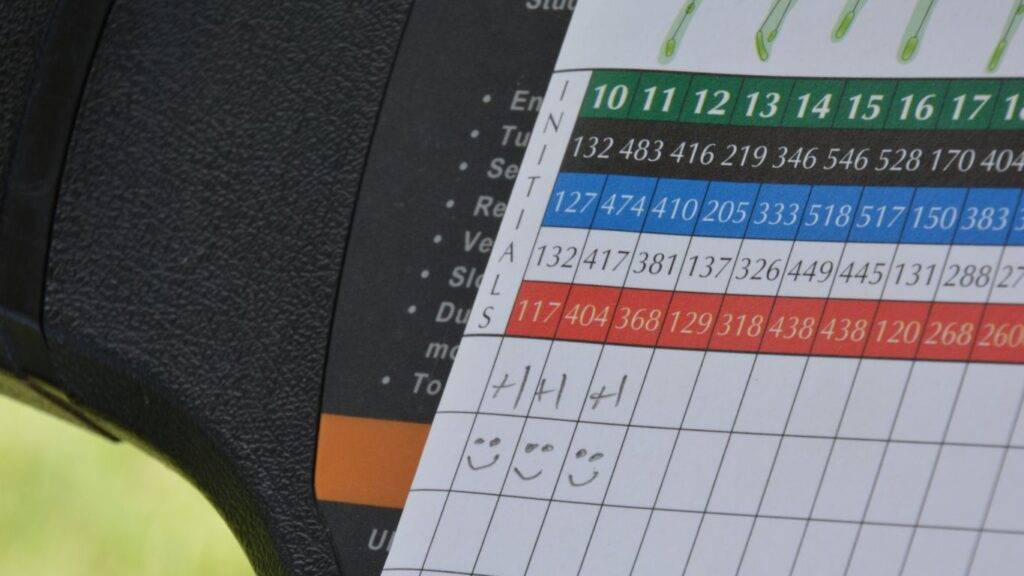With its rich history and intricate scoring system, golf can be a fascinating yet challenging sport to master. Understanding what constitutes a good score is essential, especially for beginners keen on measuring their progress. This guide will help you interpret golf scores effectively, taking into account skill levels and course difficulties.
Importance of Understanding the Golf Scoring System
Before we discuss a good score, it’s essential to grasp the basics of the golf scoring system. Knowing how your scores stack up against standard benchmarks will give you a clearer perspective on your game.
Par and Scoring

Definition of Par
“Par” is the predetermined number of strokes an expert golfer should require to complete a hole or course. For example, if a course has a par of 72, a professional golfer must finish all 18 holes in 72 strokes.
Significance of Par
Par serves as a benchmark for golfers of all skill levels. It helps set realistic scoring expectations and provides a target for striving.
Average Scores by Handicap
Golfers are often categorized by handicap, a numeric measure of a player’s potential ability. While professionals have a handicap of 0 or even lower, beginners typically have higher handicaps, reflecting their learning stage.
- Beginner
For beginners playing on a medium-difficulty course with a par of 72:
- A score under 100 is considered a solid achievement.
- Breaking 90 is an excellent score, indicating developing skills.
- Scoring under 80 is exceptional, showcasing advanced skills for a beginner.
Professional Standards
Typical Scores for Professionals
Professional golfers usually score around par or better. Their scores often range between 65 and 72 on a par 72 course, reflecting their high skill level and consistency.
Personal Goals

Setting Achievable Targets
For amateur golfers, setting realistic and achievable score targets is crucial. Focus on incremental improvements rather than immediate perfection. Here are some suggested goals:
- Aim to finish under 100 consistently.
- Work towards breaking 90 as your skills improve.
- Consider breaking 80 as a long-term goal.
Course Difficulty
Impact of Course Layout on Scoring Expectations
The difficulty of a golf course significantly affects your score. Factors such as the length of the course, the layout, and the hazards present will influence how easy or hard it is to play to par.
Factors Affecting Scores
Several factors can impact your golf score beyond just your skill level:
- Weather
Wind, rain, and extreme temperatures can make the game more challenging.
- Course Conditions
The state of the greens, fairways, and roughs can influence your performance.
- Mental Aspect
Your focus, confidence, and composure during the game are just as important as your physical skills.
FAQs
Q: What is considered a good score for an amateur golfer?
A: For an amateur golfer, a good score can vary based on their skill level and the difficulty of the course. Generally, scoring under 100 is a solid achievement for beginners, while breaking 90 indicates developing skills. For more advanced amateurs, consistently scoring under 80 is considered excellent.
Q: How does handicap affect my scoring expectations?
A: Your handicap is a numerical representation of your potential ability and significantly affects your scoring expectations. A lower handicap means you are a more skilled player, aiming to shoot closer to par. Conversely, higher handicaps reflect less experienced players with higher expected scores.

Q: What factors should I consider when setting personal golf score goals?
A: When setting personal golf score goals, consider your current skill level, frequency of practice, and the types of courses you play on. Incremental improvements are practical milestones, such as consistently finishing under 100, aiming to break 90, and eventually targeting sub-80 scores.
Q: How does course difficulty influence my golf score?
A: Course difficulty plays a significant role in your golf score. Elements such as course length, layout complexity, hazards, and green conditions all factor into how challenging it is to play to par. More difficult courses will naturally yield higher scores.
Q: Can weather conditions impact my golf score?
A: Yes, weather conditions such as strong winds, rain, and extreme temperatures can make the game more challenging and affect your performance. To maintain a consistent score, it’s important to adapt your strategy and stay focused despite adverse weather.
Q: How can I improve my mental game in golf?
A: Enhancing your mental game involves building focus, confidence, and composure. Techniques such as visualization, deep breathing, positive self-talk, and maintaining a clear, calm mind on the course can significantly improve your overall performance.
Conclusion
What defines a “good” golf score varies widely based on your skill level and the course’s difficulty. For beginners on a medium-difficulty course with a par of 72, aiming for a score under 100 is a commendable target. Remember, the key is to focus on continuous improvement and, most importantly, enjoy the game. Happy golfing!









